|
Listen To The Article
|
Your telephone and Internet traffic are not the only communications subject to warrantless surveillance. The US Postal Service (USPS) is helping intelligence, law enforcement and security agencies monitor the mail of tens of thousands of people without warrants, The New York Times reported.
The Post Office is recording names, addresses and other information on the outside of packages and envelopes. This data, called a “mail cover,” is then turned over to federal agencies that request one.
“A mail cover is an investigative tool used to record data appearing on the outside of a mail piece,” an audit of the US Postal Inspection Service by the USPS Office of the Inspector General states. “Law enforcement agencies use this information to protect national security; locate fugitives; obtain evidence; or help identify property, proceeds, or assets forfeitable under criminal law.”
No warrant is required to get a mail cover as long as the mail is not actually opened. Critics say this seems to be an end-run around the Fourth Amendment, which bans warrantless searches.
Learn How To Become Invisible In Today’s Surveillance State!
The Postal Service gets this information by using a technology called Mail Imagining in which computers take digital pictures of every piece of mail sent through its system, The Times reported. Another system, the Mail Isolation Control and Tracking Program, enables the postal service to track and investigate the individual pieces of mail identified.
The audit found that the Postal Inspection Service had violated its own rules by issuing large numbers of unjustified and questionable mail covers. An investigation by The Times indicates that thousands of innocent people might have been subject to mail covers.
“It appears that there has been widespread disregard of the few protections that were supposed to be in place,” Theodore Simon, the president of the National Association of Criminal Defense Attorneys, said of mail covers.
Maricopa County, Arizona, Sheriff Joe Arpaio allegedly used mail covers to spy on one of his political opponents, Maricopa County Supervisor Mary Rose Wilcox. The Postal Service granted the orders enabling Arpaio and Maricopa County Attorney Andrew Thomas to track Wilcox’s mail.
Using the data from the covers, Arpaio was able to get warrants to acquire Wilcox’s banking information and business records and raid Wilcox’s business. Wilcox thinks Arpaio investigated her because she criticized some of his policies. Wilcox sued the county and won $1 million after she lost a contract to operate a concession at an airport. Thomas was later disbarred for his actions.
“I don’t blame the Postal Service, but you shouldn’t be able to just use these mail covers to go on a fishing expedition,” Wilcox told the newspaper. “There needs to be more control.”
Story continues below video:
Simon told The Times he believes the Postal Service is using mail covers to conduct uncontrolled snooping into Americans’ private lives. The Inspector General’s investigation seems to confirm Mr. Simon’s fears.
Some of the abuses of mail covers exposed by the Inspector General included:
- No one knows how many mail covers have been executed. The USPS “processed” around 49,000 requests for mail covers in 2013, but the report does not say how many of the requests were carried out.
- Postal Service policy states that only a handful of high ranking postal inspectors can approve mail cover requests. Yet 21 percent of requests in a sample examined by the inspector general were approved by persons without the proper written authority.
- Around 13 percent of the requests in a sample of 196 requests for mail covers from police agencies did not meet the USPS requirements.
Documents obtained by The Times indicated that federal agencies using mail covers to monitor Americans include the US Army Criminal Investigations Command, the Georgia Bureau of Investigation, the State Department and even the Department of Veterans of Affairs.
The number of requests for mail covers from security agencies such as the FBI and the NSA is unknown because that data is apparently classified information.
“There are a lot of mail covers, but they don’t seem to be very careful about following their own rules,” Kate Martin of the Center for National Security Studies said.
Do you believe “mail covers” violate constitutionally protected rights? Share your thoughts in the section below:
 Off The Grid News Better Ideas For Off The Grid Living
Off The Grid News Better Ideas For Off The Grid Living





